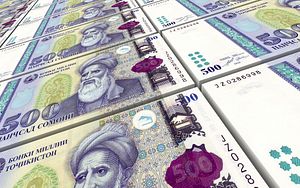In the latest piece of news bolstering the impression that Tajikistan is facing a banking crisis (or soon will be), Asia Plus, a Tajik news outlet, reported Tojiksodirotbank “may force some of its employees to take unpaid vacation for an uncertain time.”
Tojiksodirotbank is the second-largest commercial bank in Tajikistan.
A source at the bank told Asia Plus last week “[p]ersons selected for redundancy have already been informed of that.”
In March, Tojiksodirotbank said service interruptions–resulting in customers signing up for waiting lists to withdraw their cash–were due to technical difficulties in implementing a new processing system. Eurasianet reported, however, that “Tojiksodirotbank’s cash dispensers are running dry.” Days after explaining the service issue, Tojiksodirotbank issued a press release that the National Bank of Tajikistan (NBT) had met with representatives of the European Bank for Reconstruction and Development (EBRD), “regarding the development of the Tajik banking sector, in particular with regards to the role of the systemic banks, such as Tojiksodirotbank (TSB).” The release also said the EBRD supported TSB’s new strategy, “grounded on strengthening bank’s capitalization and aimed at achieving stronger growth and better quality of lending to the real sector, including through attraction of new foreign institutional investors to the bank’s capital structure.”
As I reported in February, the IMF was concerned about Tajikistan’s banking sector. In a report on the stability of the country’s financial systems, the IMF said one major bank was insolvent (Agroinvestbank–AIB) and an unnamed second bank (which Eurasianet suggests is none other than TSB), “fails to meet all prudential requirements.” In dealing with AIB, the Tajik government has focused on cutting costs and calling in bad loans. Eurasianet reported, “The government also proposed cutting staff by 10 to 15 percent.”
As I wrote in February, with regard to AIB:
The best recommendation the IMF has for fixing AIB is “recapitalizing with conditions” which could cost as much as 2.5 percent of GDP. For Central Asia’s poorest state, that’s not insignificant. Other options for resolving the bank’s issue entail legal changes or fully liquidating the bank. The bank is considered systemically important by the National Bank of Tajikistan.
Later in February, the Financial Times reported that the IMF was in talks with Tajikistan for a $500 million bailout package.
In several places in the IMF report, it’s noted that staffing shortages can “hinder full investigations into noncompliant, or unsafe and unsound practices, limit the follow-through in appeals cases and media inquiries into high profile enforcement cases.” While the IMF comments were directed at the NBT, the same would apply to commercial banks like TSB. Cutting staff might save on operating costs, but it also cuts down on the bank’s ability to operate sufficiently. In addition, there are the social consequences of layoffs or forced unpaid leave.
Tajikistan, the world’s most remittance dependent country, has serious unemployment issues, driving Tajiks to go abroad for work by the hundreds of thousands. While official statistics, cited by the CIA World Factbook for example, list unemployment at 2.5 percent, most analysts would agree that’s an impossibly low number for the region’s poorest state. One way to maintain the facade of employment is to not fire people and merely push them into unpaid vacation.

































